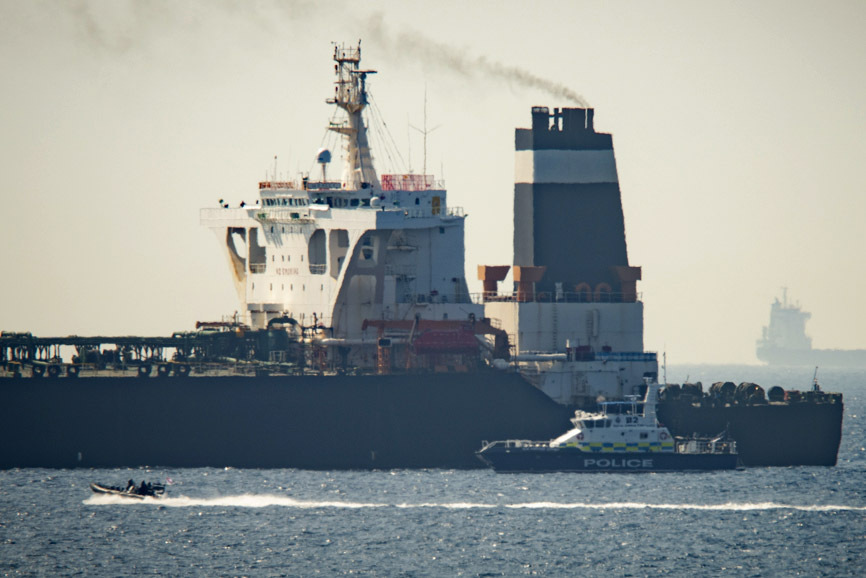

A British marine ship patrols near supertanker Grace 1 off the coast of Gibralta.
Iran has denounced Britain's detention of an Iranian tanker last week as "threatening" and an "act of piracy", following a dramatic intervention that has sparked Tehran's fury amid tensions over its nuclear programme.
What's behind the seizure of an Iranian oil tanker?
British Royal Marines, police and customs agents on Thursday stopped and seized the Grace 1 vessel in Gibraltar on suspicion it carried Iranian crude oil to Syria in breach of European Union sanctions against President Bashar al-Assad's government.
In a speech broadcast live on state television on Monday, the Iranian defence minister, Amir Hatami said Tehran would not tolerate such "threatening" behaviour.
"These days we witnessed a threatening act from the government of England in the Strait of Gibraltar against a tanker from the Islamic Republic of Iran," Hatami said.
"This is an incorrect and wrong action, an action similar to maritime robbery ... certainly these kind of robberies will not be tolerated."
Iran has denied allegations that the 330-metre tanker was carrying crude to the Baniyas Refinery in Syria.
Speaking to reporters in Tehran on Sunday, Iran's deputy foreign minister Abbas Araghchi said: "The tanker was carrying Iran's oil ... Contrary to what the British government claims, its destination was not Syria."
He added: "The port named in Syria does not even have the capacity for such a supertanker to dock. Its destination was somewhere else."
Gulf tensions
Araghchi said the tanker was crossing the Strait of Gibraltar because its "high capacity" meant "it was not possible for it to pass through the Suez Canal".
He added that Iran was currently following "the legal path through court" but hoped the issue could be resolved by diplomatic consultations.
Iran has demanded that the UK release the tanker immediately, with a senior commander in Iran's elite Revolutionary Guard saying on Friday it was Tehran's "duty" to act alike and seize a British oil tanker if its vessel was not released immediately.
On the same day, Gibraltar's Supreme Court ruled that the vessel could be held for 14 more days.
Iran set to exceed uranium enrichment limit in 2015 nuclear deal
Spain's foreign minister Josep Borrell said last week that Gibraltar seized the supertanker after a request by the US.
Frictions between the US and Iran have mounted in the wake of Washington's unilateral decision last year to abandon a 2015 nuclear deal with Iran and hit Tehran's crucial oil exports and financial transactions with biting sanctions.
The landmark accord offered Iran relief from global sanctions in exchange for curbs on its nuclear programme.
Iran has accused the administration of US President Donald Trump of waging "economic war" against it with a "maximum pressure" campaign to reduce Iranian oil exports to zero.
Iranian crude exports were around 300,000 barrels per day (bpd) or less in late June, industry sources said, a fraction of the more than 2.5 million bpd Iran shipped in April 2018, the month before Trump withdrew from the nuclear deal.
European signatories to the deal - the UK, France and Germany - oppose Washington's exit from the agreement, but have struggled to salvage it and protect Iran from the sanctions.
Iran has responded by announcing a phased reduction of compliance with the pact. On July 1, it surpassed uranium stockpile limits set by the treaty, and on Sunday said it would begin enriching uranium beyond the permitted cap "within hours".
The heightened frictions between the US and Iran escalated to the brink of a military confrontation in June when Iranian forces shot down a US military drone it claimed had violated its airspace. Washington denies the claim, saying the spy plane was shot down over international waters.
No comments:
Post a Comment